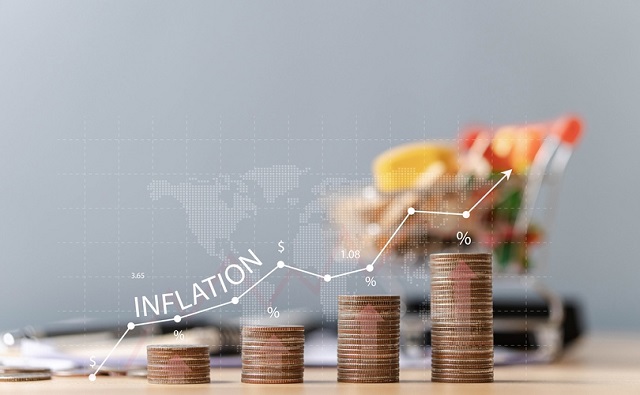Business
Bank of Canada admits eliminating carbon tax could reduce inflation by 16%

From LifeSiteNews
Bank of Canada Governor Tiff Macklem testified that cutting the tax would create a one-time reduction of inflation by 0.6%, which is 16% of Canada’s total inflation rate
Bank of Canada Governor Tiff Macklem admitted that Trudeau’s carbon tax is responsible for 16% of Canada’s current inflation rate.
On October 30, Macklem told the House of Commons finance committee that eliminating the carbon tax would reduce inflation by 0.6%, which is 16% of Canada’s total inflation rate.
“That would create a one-time drop in inflation of 0.6 percentage points,” Macklem told Conservative MP Philip Lawrence, who had questioned the tax’s effect on the economy.
Currently, Canada’s inflation rate is at 3.8% which means that a decrease of 0.6% by eliminating the tax would result in a 16% decrease in the overall inflation.
Lawrence further questioned if eliminating the tax would ease the economic situation, considering it would mean a “sizable drop in inflation.” However, Macklem explained that cutting the tax would only affect inflation for one year.
“It would be helpful if monetary and fiscal policy was rowing in the same direction,” he added, explaining that government spending has made keeping interest rates steady a difficult task.
“Any standard economic textbook will tell you if you cut government spending that will tend to slow growth, raise the unemployment rate, and reduce inflation,” Macklem explained.
In September, Macklem admitted that food costs are of particular concern as “[m]eat’s up six percent, bread’s up 13 percent, coffee’s up eight percent, baby food’s up nine percent. If you look at food overall it is up nine percent.”
Macklem revealed at the time that food prices are rising significantly faster than the headline inflation rate – the overall inflation rate in the country – as staple food items are increasing at a rate of 10 percent to 18 percent year-over-year.
To combat this inflation, the Bank of Canada has raised interest rates to 5 percent, the highest benchmark rate in 22 years. Another increase is expected in October.
In addition to deficit spending, others have pointed to the Trudeau government’s ongoing carbon taxes and energy regulations as one of the reasons for the sharp increases in the cost of living.
According to a March report, Trudeau’s carbon tax is costing Canadians hundreds of dollars annually as government rebates remain insufficient to compensate for the increased fuel prices.
Last week, Prime Minster Justin Trudeau suspended his carbon tax on home heating oil, amid rising costs of living and his decreasing popularity across multiple polls.
Under the new regulations, home heating oil is exempted from the carbon tax, while rural residents will receive a 10 percent increase in the carbon tax rebate payments. The increase is set to climb to 20 percent beginning next year.
In March, the Parliamentary Budget Officer calculated the total carbon tax costs for fuel in 2023 minus government rebates. The steepest increase is for Albertans, who will pay an average of $710 extra per household. Following Alberta is Ontario with a $478 increase.
Prince Edward Island households will pay an extra $465, Nova Scotia $431, Saskatchewan $410, Manitoba $386, and Newfoundland and Labrador $347.
The increased costs are only expected to rise as a recent report revealed that a carbon tax of more than $350 per tonne is needed to reach Trudeau’s net-zero goals by 2050.
Currently, Canadians living in provinces under the federal carbon pricing scheme pay $65 per tonne, but the Trudeau government has a goal of $170 per tonne by 2030.
Business
UNDRIP now guides all B.C. laws. BC Courts set off an avalanche of investment risk

From Resource Works
Gitxaala has changed all the ground rules in British Columbia reshaping the risks around mills, mines and the North Coast transmission push.
The British Columbia Court of Appeal’s decision in Gitxaala v. British Columbia (Chief Gold Commissioner) is poised to reshape how the province approves and defends major resource projects, from mills and mines to new transmission lines.
In a split ruling on 5 December, the court held that British Columbia’s Declaration on the Rights of Indigenous Peoples Act makes consistency with the United Nations Declaration on the Rights of Indigenous Peoples a question courts can answer. The majority went further, saying UNDRIP now operates as a general interpretive aid across provincial law and declaring the Mineral Tenure Act’s automatic online staking regime inconsistent with article 32(2).
University of Saskatchewan law professor Dwight Newman, who has closely followed the case, says the majority has stretched what legislators thought they were doing when they passed the statute. He argues that section 2 of British Columbia’s UNDRIP law, drafted as a purpose clause, has been turned from guidance for reading that Act into a tool for reading all provincial laws, shifting decisions that were meant for cabinet and the legislature toward the courts.
The decision lands in a province already coping with legal volatility on land rights. In August, the Cowichan Tribes title ruling raised questions about the security of fee simple ownership in parts of Richmond, with critics warning that what used to be “indefeasible” private title may now be subject to senior Aboriginal claims. Newman has called the resulting mix of political pressure, investor hesitation and homeowner anxiety a “bubbling crisis” that governments have been slow to confront.
Gitxaala’s implications reach well beyond mining. Forestry communities are absorbing another wave of closures, including the looming shutdown of West Fraser’s 100 Mile House mill amid tight fibre and softwood duties. Industry leaders have urged Ottawa to treat lumber with the same urgency as steel and energy, warning that high duties are squeezing companies and towns, while new Forests Minister Ravi Parmar promises to restore prosperity in mill communities and honour British Columbia’s commitments on UNDRIP and biodiversity, as environmental groups press the government over pellet exports and protection of old growth.
At the same time, Premier David Eby is staking his “Look West” agenda on unlocking about two hundred billion dollars in new investment by 2035, including a shift of trade toward Asia. A centrepiece is the North Coast Transmission Line, a grid expansion from Prince George to Bob Quinn Lake that the government wants to fast track to power new mines, ports, liquefied natural gas facilities and data centres. Even as Eby dismisses a proposed Alberta to tidewater oil pipeline advanced under a new Alberta memorandum as a distraction, Gitxaala means major energy corridors will also be judged against UNDRIP in court.
Supporters of the ruling say that clarity is overdue. Indigenous nations and human rights advocates who backed the appeal have long argued that governments sold UNDRIP legislation as more than symbolism, and that giving it judicial teeth will front load consultation, encourage genuine consent based agreements and reduce the risk of late stage legal battles that can derail projects after years of planning.
Critics are more cautious. They worry that open ended declarations about inconsistency with UNDRIP will invite strategic litigation, create uncertainty around existing approvals and tempt courts into policy making by another name, potentially prompting legislatures to revisit UNDRIP statutes altogether. For now, the judgment leaves British Columbia with fewer excuses: the province has built its growth plans around big, nation building projects and reconciliation framed as partnership with Indigenous nations, and Gitxaala confirms that those partnerships now have a hard legal edge that will shape the next decade of policy and investment.
Resource Works News
Business
Too nice to fight, Canada’s vulnerability in the age of authoritarian coercion

By Stephen Nagy for Inside Policy
Beijing understands what many Canadians still resist: that our greatest national virtues, including our desire to be an “honest broker” on the world stage, have become our most exploitable weaknesses.
On December 1, 2018, RCMP officers arrested Huawei CFO Meng Wanzhou at Vancouver International Airport. As Canadians know well, within days, China seized two Canadians, Michael Kovrig and Michael Spavor, on fabricated espionage charges. For 1,019 days, they endured arbitrary detention while Canada faced an impossible choice of abandoning the rule-of-law or watching its citizens suffer in Chinese prisons.
This was hostage diplomacy. But more insidiously, it was also the opening move in a broader campaign against Canada, guided by the ancient Chinese proverb “借刀杀人” (Jiè dāo shā rén), or “Kill with a borrowed knife.” Beijing’s strategy, like the proverb, exploits others to do its bidding while remaining at arm’s length. In this case, it seeks to exploit Canadian vulnerabilities such as our resource-dependent economy, our multicultural identity, our loosely governed Arctic territories, and our naïve belief that we can balance relationships with all major powers – even when those powers are in direct conflict with one another.
With its “borrowed knife” campaign, Beijing understands what many Canadians still resist: that our greatest national virtues, including our desire to be an “honest broker” on the world stage, have become our most exploitable weaknesses.
The Weaponization of Canadian Niceness
Canadian foreign policy rests on the Pearsonian tradition. It is the belief that our lack of imperial history and (now irrelevant) middle-power status uniquely positions us as neutral mediators. We pride ourselves on sending peacekeepers, not warfighters. We build bridges through dialogue and compromise.
Beijing exploited this subjective, imagined identity. When Canada arrested Meng pursuant to our extradition treaty with the United States, Chinese state media framed it as Canada “choosing sides” and betraying its honest broker role. This narrative trapped Canadian political culture. Our mythology says we transcend conflicts through enlightened multilateralism. But the modern world increasingly demands choosing sides.
When former Prime Minister Jean Chrétien and former Ambassador John McCallum advocated releasing Meng to free the “Two Michaels,” they weren’t acting as Chinese agents. They were expressing a genuinely Canadian impulse that conflict resolves through compromise. Yet this “Canadian solution” was precisely what Beijing sought, abandoning legal principles under pressure.
China’s economic coercion has followed a similar logic. When Beijing blocked Canadian canola, pork, and beef exports – targeting worth $2.7 billion worth of Prairie agricultural products – the timing was transparently political. However, China maintained the fiction of “quality concerns,” making it extremely difficult for Canada to challenge the restrictions via the World Trade Organization. At the same time, Prairie farmers pressured Ottawa to accommodate Beijing.
The borrowed knife was Canadian democratic debate itself, turned against Canadian interests. Beijing didn’t need to directly change policy, it mobilized Canadian farmers, business lobbies, and opposition politicians to do it instead.
The Arctic: Where Mythology Meets Reality
No dimension better illustrates China’s strategy than the Arctic. Canada claims sovereignty over vast northern territories while fielding six icebreakers to Russia’s forty. We conduct summer sovereignty operations that leave territories ungoverned for nine months annually. Chinese state-owned enterprises invest in Arctic mining, Chinese research vessels map Canadian waters, and Beijing now calls itself a “near-Arctic state,” a term appearing nowhere in international law.
This campaign weaponizes the gap between Canadian mythology and capacity. When China proposes infrastructure investment, our reflex is “economic opportunity.” When Chinese researchers request Arctic access, our instinct is accommodation because we’re co-operative multilateralists. Each accommodation establishes precedent, each precedent normalizes Chinese presence, and each normalized presence constrains future Canadian options.
Climate change accelerates these dynamics. As ice melts, the Northwest Passage becomes navigable. Canada insists these are internal waters. China maintains they’re international straits allowing passage. The scenario exposes Canada’s dilemma perfectly. Does Ottawa escalate against our second-largest trading partner over waters we cannot patrol, or accept Chinese transits as fait accompli? Either choice represents failure.
The Diaspora Dilemma
Canada’s multiculturalism represents perhaps our deepest national pride. The Chinese Communist Party has systematically weaponized this openness through United Front Work Department operations, an ostensibly independent community organization that provides genuine services while advancing Beijing’s agenda including: monitoring dissidents, mobilizing Chinese-Canadians for CCP-approved candidates, organizing counter-protests against Tibetan and Uyghur activists, and creating environments where criticism of Beijing risks community ostracism and threats to relatives in China.
The establishment of illegal Chinese police stations in Toronto and Vancouver represents this operation’s logical endpoint. These “overseas service centres” conducted intimidation operations, pressured targets to return to China, and maintained surveillance on diaspora communities.
Canada’s response illuminates our vulnerability. When investigations exposed how Chinese organized crime groups, operating with apparent CCP protection, laundered billions through Vancouver real estate while financing fentanyl trafficking, initial reactions accused investigators of anti-Chinese bias. When CSIS warned that MPs might be compromised, debate focused on whether the warning represented racial profiling rather than whether compromise occurred.
Beijing engineered this trap brilliantly. Legitimate criticism of CCP operations becomes conflated with anti-Chinese racism. Our commitment to multiculturalism gets inverted into paralysis when a foreign government exploits ethnic networks for political warfare. The borrowed knife is Canadian anti-racism, wielded against Canadian sovereignty and this leaves nearly two million Chinese-Canadians under a cloud of suspicion while actual operations continue with limited interference.
What Resistance Requires
Resisting comprehensive pressure demands abandoning comfortable myths and making hard choices.
First, recognize that 21st-century middle-power independence is increasingly fictional. The global order is re-polarizing. Canada cannot maintain equidistant relationships with Washington and Beijing during strategic competition. We can trade with China, but not pretend shared rhetoric outweighs fundamental disagreements about sovereignty and human rights. The Pearsonian honest-broker role is obsolete when major powers want you to choose sides.
Second, invest in sovereignty capacity, not just claims. Sovereignty is exercised or forfeited. This requires sustained investment in military forces, intelligence services, law enforcement, and Arctic infrastructure. It means higher defence spending, more robust counterintelligence, and stricter foreign investment screening, traditionally un-Canadian approaches, which is precisely why we need them.
Third, build coalitions with countries facing similar pressures. Australia, Japan, South Korea, Lithuania, and others have faced comparable campaigns. When China simultaneously blocks Canadian canola, Australian wine, and Lithuanian dairy, that’s not separate trade disputes but a pattern requiring coordinated democratic response. The borrowed knife only works when we’re isolated.
Fourth, Ottawa must do much more to protect diaspora communities while confronting foreign operations. Effective policy must shut down United Front operations and illegal police stations while ensuring actions don’t stigmatize communities. Success requires clear communication that we’re targeting a foreign government’s operations, not an ethnic community.
Finally, we must accept the necessity of selective economic diversification. Critical infrastructure, sensitive technologies, and strategic resources cannot be integrated with an authoritarian state weaponizing interdependence. This means higher costs and reduced export opportunities – but maximum efficiency sometimes conflicts with strategic resilience. Canada can achieve this objective with a synergistic relationship with the US and other allies and partners that understand the tangential link between economic security and national security.
Conclusion
Canada’s myths, that we transcend conflicts, that multiculturalism creates only strength, that resource wealth brings pure prosperity and positivity, coupled with our deep vein of light-but-arrogant anti-Americanism, have become exploitable weaknesses. Beijing systematically tested each myth and used the gap between self-conception and reality as leverage.
The borrowed knife strategy works because we keep handing over the knife. Our openness becomes the vector for interference. Our trade dependence becomes the lever for coercion. Our niceness prevents us from recognizing we’re under attack.
Resistance doesn’t require abandoning Canadian values. It requires understanding that defending them demands costs we’ve historically refused to pay. The Chinese “Middle Kingdom” that tells the world it has had 5,000 years of peaceful history has entered a world that doesn’t reward peaceability, it exploits it. The question is whether we’ll recognize the borrowed knife for what it is and put it down before we bleed out from self-inflicted wounds.
Stephen R. Nagy is a professor of politics and international studies at the International Christian University in Tokyo and a senior fellow and China Project lead at the Macdonald-Laurier Institute (MLI). The title for his forthcoming monograph is “Japan as a Middle Power State: Navigating Ideological and Systemic Divides.”
-

 C2C Journal2 days ago
C2C Journal2 days agoWisdom of Our Elders: The Contempt for Memory in Canadian Indigenous Policy
-

 Sports1 day ago
Sports1 day agoEgypt, Iran ‘completely reject’ World Cup ‘Pride Match’ plan
-

 Alberta2 days ago
Alberta2 days agoAlberta introducing three “all-season resort areas” to provide more summer activities in Alberta’s mountain parks
-

 National12 hours ago
National12 hours agoCanada’s free speech record is cracking under pressure
-

 Business14 hours ago
Business14 hours agoTaxpayers Federation calls on politicians to reject funding for new Ottawa Senators arena
-

 Business15 hours ago
Business15 hours agoAlbertans give most on average but Canadian generosity hits lowest point in 20 years
-

 Automotive2 days ago
Automotive2 days agoThe $50 Billion Question: EVs Never Delivered What Ottawa Promised
-

 Censorship Industrial Complex18 hours ago
Censorship Industrial Complex18 hours agoOttawa’s New Hate Law Goes Too Far





